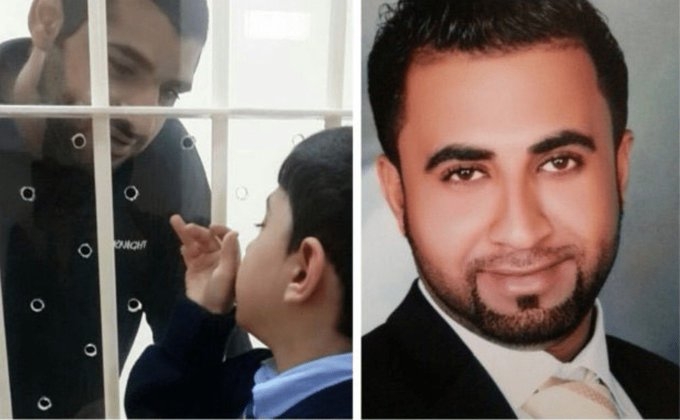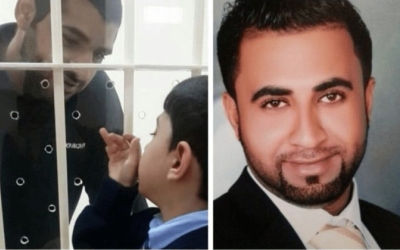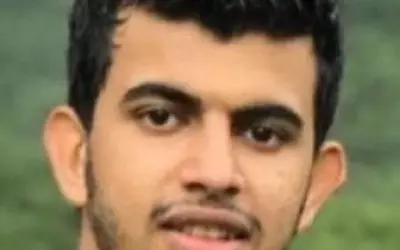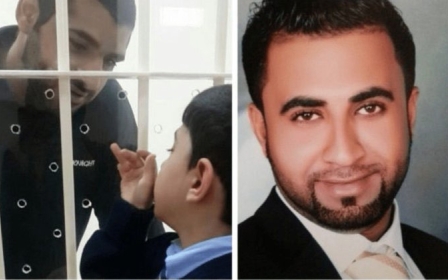Bahrain king urged to commute death sentences of pro-democracy activists

More than a dozen human rights groups have signed an open letter to Bahrain's king in a last-ditch attempt to commute the death sentences of two activists who were charged with killing an officer by bombing a police convoy in 2014.
The signatories included Human Rights Watch and Reprieve, who maintain that Mohamed Ramadhan and Hussain Ali Moosa had not received a fair trial and were charged after the Bahraini police gained confessions from torture.
New MEE newsletter: Jerusalem Dispatch
Sign up to get the latest insights and analysis on Israel-Palestine, alongside Turkey Unpacked and other MEE newsletters
"We, the undersigned organisations, urge you to commute the death sentences of Mohamed Ramadhan and Hussain Ali Moosa, who have exhausted all legal remedies available to them after the Court of Cassation upheld their death sentences," the statement noted.
Earlier this month, a Bahraini court upheld the death sentences of the two pro-democracy activists.
All avenues for the two men have now been exhausted, pending ratification the king.
The letter urged the king to issue a retrial of the men and demanded the king free ten other detainees in Bahrain sentenced to death or at risk of execution.
It also called for the abolition of the death penalty and demanded Bahrain consider establishing a moratorium on executions.
Suspended by limbs and beaten
Security forces arrested Moosa, a hotel employee, and Ramadhan, a security guard at Bahrain's international airport, in early 2014 after a policeman was killed in a bombing in al-Deir, a village northeast of Manama. Ten other people tried with them have also been jailed.
Ramadhan refused to sign a confession but Moosa says he signed a statement in which he made a false confession and incriminated Ramadhan after being suspended by his limbs and beaten for several days.
They were sentenced to death in December 2014, and Bahrain’s highest court upheld the capital punishment a year later.
Both were prevented from meeting their lawyers until after they had been sentenced to death for the first time in December 2014, the rights groups say.
In 2018, the Special Investigations Unit (SIU), which is part of the public prosecutor’s office, uncovered a medical report by a government doctor saying Moosa had injuries that matched his allegations of torture.
After the SIU released its findings and called for the death sentences to be revoked, the Court of Cassation, which had issued them, in October 2018 overturned its earlier ruling.
The Court of Cassation then asked for the death sentences to be reviewed.
The separate High Criminal Court of Appeal reissued the death sentences in January.
UK appeal
Responsibility for investigation torture in Bahrain lies with the SIU, which is part of the justice ministry, and the ombudsman's office, which is held within the interior ministry.
Both organisations have received training and support from the UK, yet both have been described by the United Nations Committee Against Torture as being ineffective and lacking independence.
Earlier this month, 46 MPs and peers from across most of the UK’s major parties signed an open letter calling on Britain's government to urgently intervene in the case.
“The UK government has consistently failed to criticise due process violations in their trial or acknowledge abuses Mohammed and Hussain have suffered. Just last week, the Foreign Office said it 'welcomed' the work of SIU and Ombudsman,” the letter read.
“The persistence of torture and the significant rise in the use of the death penalty since 2017 in Bahrain show that this soft-touch approach has not worked, and a further 10 inmates are at imminent risk of execution."
Middle East Eye delivers independent and unrivalled coverage and analysis of the Middle East, North Africa and beyond. To learn more about republishing this content and the associated fees, please fill out this form. More about MEE can be found here.





